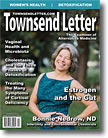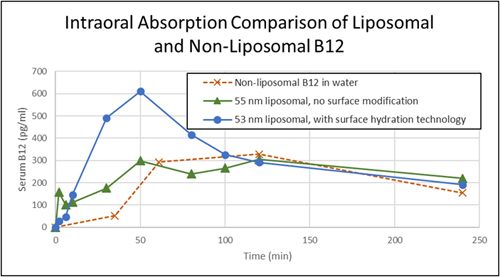|
![]()
From the Townsend Letter |
|||
A Push-Catch System That Enables Effective Detoxification by Christopher Shade, PhD, and Carrie Decker, ND |
|||
|
Nanoscale Delivery Systems Optimize Detoxification Figure 5: Comparison of B12 absorption intraorally in human subject.
Figures, larger in .pdf Dr. Christopher Shade, PhD, founder and CEO of Quicksilver Scientific, specializes in the biological, environmental, and analytical chemistry of mercury in all its forms and their interactions with sulfur compounds, particularly glutathione and its enzyme system. He has patented analytical systems for mercury speciation (separation of different forms of mercury), founded the only clinical lab in the world offering mercury speciation in human samples, and has designed cutting edge systems of nutraceuticals for detoxification and antioxidant protection, including advanced phospholipid delivery systems for both water- and fat-soluble compounds. Dr. Shade is regularly sought out to speak as an educator on the topics of mercury, environmental toxicities, neuroinflammation, immune dysregulation, and the human detoxification system for practitioners and patients in the United States and internationally. Dr. Carrie Decker, ND, graduated with honors from the National College of Natural Medicine (now the National University of Natural Medicine) in Portland, Oregon. Dr. Decker sees patients at her office in Portland, OR, as well as remotely, with a focus on gastrointestinal disease, mood imbalances, eating disorders, autoimmune disease, and chronic fatigue. Prior to becoming a naturopathic physician, Dr. Decker was an engineer and obtained graduate degrees in biomedical and mechanical engineering from the University of Wisconsin-Madison and University of Illinois at Urbana-Champaign respectively. Dr. Decker continues to enjoy academic research and writing, and uses these skills to support integrative medicine education as a writer and contributor to various resources. Contact information: Carrie Decker, ND |
|||
![]()
Consult your doctor before using any of the treatments found within this site.
![]()
Subscriptions
are available for
Townsend Letter, the Examiner of Alternative Medicine
magazine, which is
published 10 times each year. Search our pre-2001
archives for further information. Older issues of the printed magazine
are also indexed for your convenience.
1983-2001
indices ; recent indices. Once you find the magazines you'd like to order, please
use our
convenient form, e-mail subscriptions@townsendletter.com,
or call 360.385.6021.
360.385.6021
Fax: 360.385.0699
info@townsendletter.com
Who are
we? | New articles | Featured
topics | e-Edition |
Tables of contents | Subscriptions | Contact
us | Links | Classifieds | Advertise |
Alternative
Medicine Conference Calendar | Search site | Archives |
EDTA Chelation Therapy | Home
© 1983-2018 Townsend Letter
All rights reserved.
Website by Sandy
Hershelman Designs
![]()






